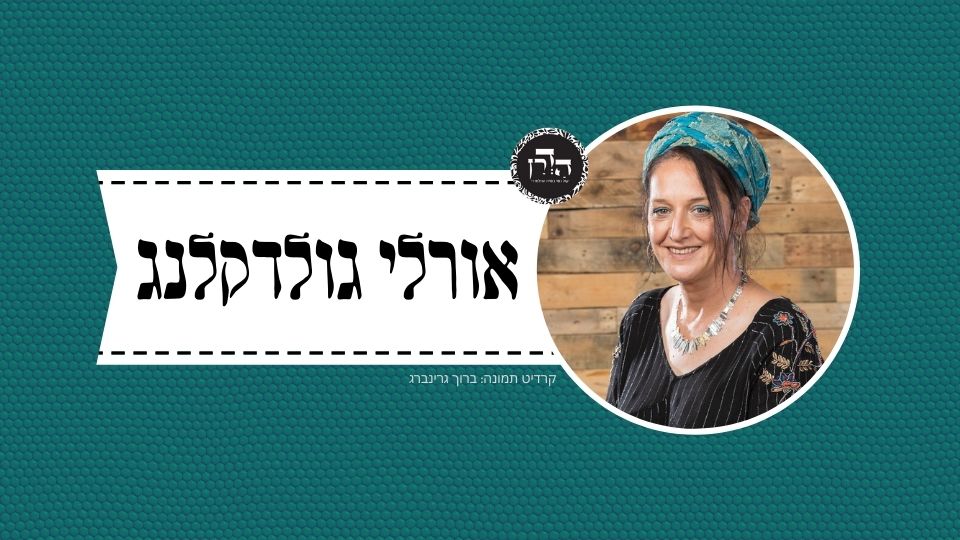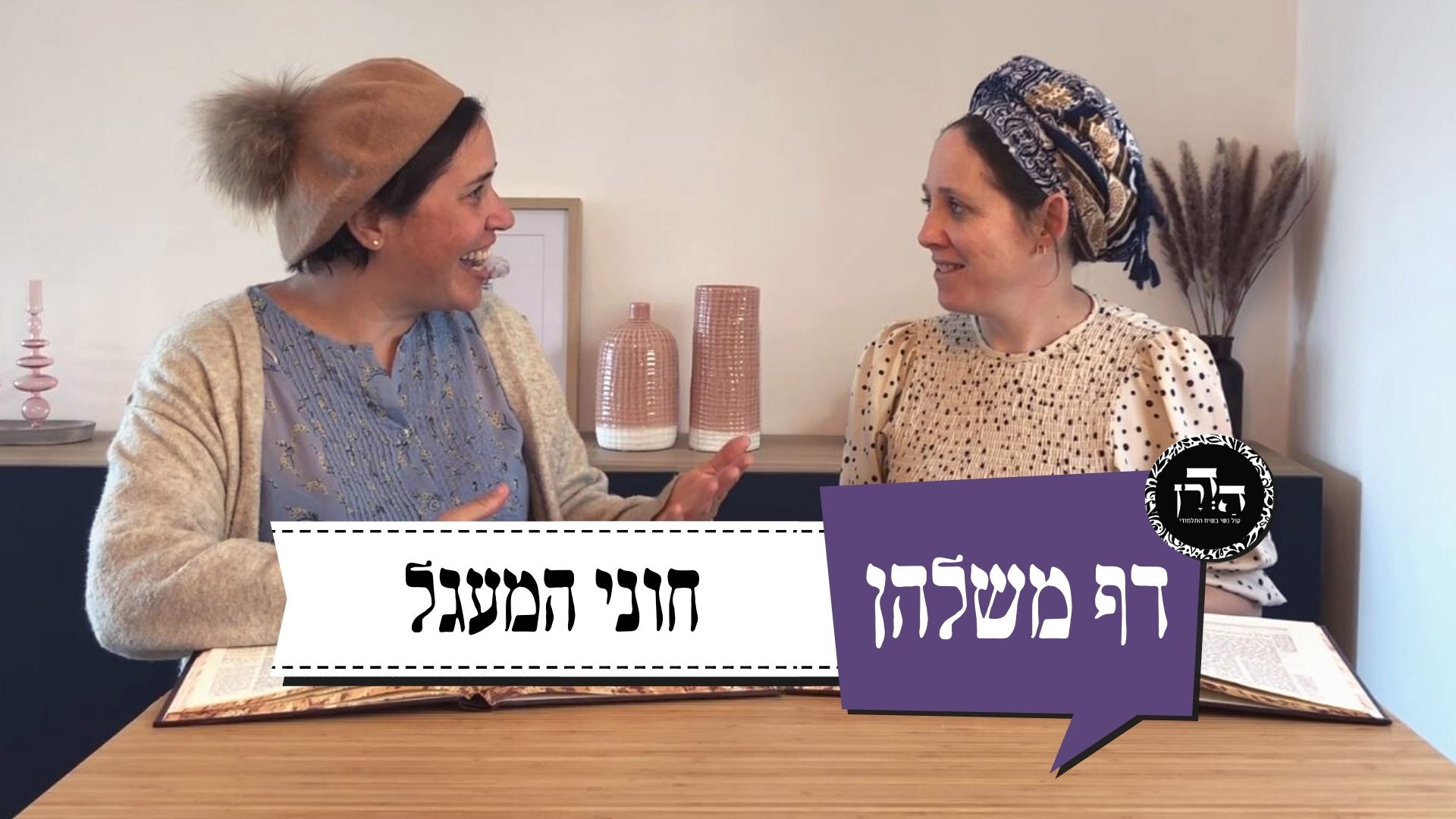אם מישהו אמר "בהמה זו תמורה עולה תמורת שלמים”, מה התכוון בדבריו – האם הולכים אחר תחילת דבריו או גם לפי מה שאמר בסוף? מחלוקת ר’ מאיר ור’ יוסי במקרה הזה ובכמה מקרים דומים אחרים. הגמרא דנה במקרים שונים שדומים למקרה זה ומה עושים עם הבהמה בכל אחד מהמקרים. איזה לשונות הם לשונות של תמורה ואיזה לשונות הם לשונות של פדיון?
הלימוד השבוע מוקדש לזכות ולשלום הַיְימׇנוֹט אֱמוּנָה בַּת באנצ’י (קָסָאוּ) בת 11 שנעלמה במקום מגוריה בצפת, לפני שנתיים, ביום ט”ז אדר תשפ”ד (25.2.24), ולא נודעו עקבותיה.
רוצה להקדיש שיעור?

כלים
הלימוד השבוע מוקדש לזכות ולשלום הַיְימׇנוֹט אֱמוּנָה בַּת באנצ’י (קָסָאוּ) בת 11 שנעלמה במקום מגוריה בצפת, לפני שנתיים, ביום ט”ז אדר תשפ”ד (25.2.24), ולא נודעו עקבותיה.
כלים
העמקה
רוצה להבין מה באמת קורה מתחת לפני השטח של הסוגיה?
שיעורים, פודקאסטים והרחבות של מיטב המורות שלנו יפתחו לך עוד זוויות וכיווני חשיבה.
חדשה בלימוד הגמרא?
זה הדף הראשון שלך? איזו התרגשות עצומה! יש לנו בדיוק את התכנים והכלים שיעזרו לך לעשות את הצעדים הראשונים ללמידה בקצב וברמה שלך, כך תוכלי להרגיש בנוח גם בתוך הסוגיות המורכבות ומאתגרות.
פסיפס הלומדות שלנו
גלי את קהילת הלומדות שלנו, מגוון נשים, רקעים וסיפורים. כולן חלק מתנועה ומסע מרגש ועוצמתי.
תמורה כו
גְּמָ׳ אָמַר רַבִּי יִצְחָק בְּרַבִּי יוֹסֵי אָמַר רַבִּי יוֹחָנָן: הַכֹּל מוֹדִים בְּאוֹמֵר ״תָּחוּל זוֹ״ וְאַחַר כָּךְ ״תָּחוּל זוֹ״ — דִּבְרֵי הַכֹּל תְּפוֹס לָשׁוֹן רִאשׁוֹן.
GEMARA: Rabbi Yitzḥak, son of Rabbi Yosei, says that Rabbi Yoḥanan says, with regard to the disagreement between Rabbi Meir and Rabbi Yosei: Everyone concedes in a case where one says: The consecration of this animal as a substitute for a burnt offering will take effect and afterward the consecration of this animal as a substitute for a peace offering will take effect. In this case, everyone agrees that one attends only to the first statement, i.e., the sanctity of the burnt offering takes effect but the sanctity of the peace offering does not take effect.
״לֹא תָּחוּל זוֹ אֶלָּא אִם כֵּן חָלְתָה זוֹ״ — תַּרְוַויְיהוּ קָדְשִׁי.
Likewise, everyone agrees that in a case where one says: Consecration of this animal as a substitute for a burnt offering shall not take effect unless the consecration of this animal as a substitute for a peace offering shall also take effect, the animal is consecrated as both a burnt offering and a peace offering.
לֹא נֶחְלְקוּ אֶלָּא כְּגוֹן מִשְׁנָתֵינוּ, דְּאָמַר ״תְּמוּרַת עוֹלָה תְּמוּרַת שְׁלָמִים״, דְּרַבִּי מֵאִיר סָבַר: מִדַּהֲוָה לֵיהּ לְמֵימַר ״תְּמוּרַת עוֹלָה וּשְׁלָמִים״, וְאָמַר ״תְּמוּרַת עוֹלָה תְּמוּרַת שְׁלָמִים״ — הָוְיָא לֵיהּ כְּאוֹמֵר ״תָּחוּל זוֹ וְאַחַר כָּךְ תָּחוּל זוֹ״.
Rabbi Meir and Rabbi Yosei disagree only with regard to a case such as the one in our mishna, where one said: This animal is the substitute of the burnt offering, the substitute of the peace offering. As Rabbi Meir holds: Since if he wanted both sanctities to take effect, he should have said: The substitute of the burnt offering and the peace offering, but instead he said: The substitute of the burnt offering, the substitute of the peace offering, he is considered like one who says: The consecration of this animal as a substitute for a burnt offering will take effect and afterward the consecration of this animal as a substitute for a peace offering will take effect. Therefore, according to Rabbi Meir only the first sanctity takes effect; the second sanctity cannot take effect because the animal is already consecrated.
וְרַבִּי יוֹסֵי סָבַר, אִי אָמַר ״תְּמוּרַת עוֹלָה וּשְׁלָמִים״, הֲוָה אָמֵינָא קְדוֹשָׁה וְאֵינָהּ קְרֵיבָה, קָא מַשְׁמַע לַן.
And Rabbi Yosei holds that from the outset he intended for both sanctities to take effect, and he did not say: The substitute of the burnt offering and the peace offering, because he reasoned that if he said that, one would say that he intends for the animal to be consecrated with two sanctities, half as a substitution of the burnt offering and half as a substitution of the peace offering. And if so, the animal cannot be sacrificed in the Temple, because it is impossible to sacrifice half the animal as one type of offering and half as another type of offering. Therefore, Rabbi Yosei teaches us that when he says: The substitute of the burnt offering the substitute of the peace offering, he intends for the animal to be both entirely a burnt offering and entirely a peace offering, as he mistakenly thinks that such an animal can be sacrificed in the Temple. But since he intended for both types of sanctity to take effect, the animal is half a burnt offering and half a peace offering.
תָּנוּ רַבָּנַן: הָאוֹמֵר ״בְּהֵמָה זוֹ חֶצְיָהּ תְּמוּרַת עוֹלָה וְחֶצְיָהּ תְּמוּרַת שְׁלָמִים״ — כּוּלָּהּ תִּקְרַב עוֹלָה, דִּבְרֵי רַבִּי מֵאִיר. וַחֲכָמִים אוֹמְרִים: תִּרְעֶה עַד שֶׁתִּסְתָּאֵב, וְתִימָּכֵר, וְיָבִיא בִּדְמֵי חֶצְיָהּ תְּמוּרַת עוֹלָה וּבִדְמֵי חֶצְיָהּ תְּמוּרַת שְׁלָמִים.
§ The Sages taught in a baraita: In the case of one who had two animals standing before him, one a burnt offering and one a peace offering, and he said with regard to one of his non-sacred animals: This animal, half of it is the substitute of the burnt offering, and half of it is the substitute of the peace offering, that animal is the substitute of the burnt offering and is therefore entirely sacrificed as a burnt offering. This is the statement of Rabbi Meir. And the Rabbis say: It is left to graze until it becomes blemished, and then it is sold, and the owner brings a substitute burnt offering with the payment for half the animal and a substitute peace offering with the payment for half the animal.
אָמַר רַבִּי יוֹסֵי: אִם לְכָךְ נִתְכַּוֵּון מִתְּחִלָּה, הוֹאִיל וְאִי אֶפְשָׁר לְהוֹצִיא שְׁנֵי שֵׁמוֹת כְּאַחַת — דְּבָרָיו קַיָּימִין. רַבִּי יוֹסֵי הַיְינוּ רַבָּנַן! כּוּלָּהּ רַבִּי יוֹסֵי קָתָנֵי לַהּ.
The baraita concludes: Rabbi Yosei said: If that was his intent from the outset, then since it is impossible to call two designations simultaneously, his statement stands, and the animal is half a burnt offering and half a peace offering. The Gemara objects: The opinion of Rabbi Yosei is identical to the opinion of the Rabbis. The Gemara explains: Rabbi Yosei taught the entire baraita, and the opinion of the Rabbis in the baraita is Rabbi Yosei’s opinion.
תַּנְיָא אִידַּךְ: ״בְּהֵמָה, חֶצְיָהּ עוֹלָה וְחֶצְיָהּ חַטָּאת״ — כּוּלָּהּ תִּיקְרַב עוֹלָה, דִּבְרֵי רַבִּי מֵאִיר.
It is taught in another baraita: In a case where one says: This animal, half of it is designated as a burnt offering and half of it is designated as a sin offering, Rabbi Meir holds that we attend only to the first statement that he uttered, and therefore half of the animal becomes consecrated as a burnt offering. Since the animal cannot live if half of its body were removed, the sanctity spreads to the entire animal and it is sacrificed entirely as a burnt offering. This is the statement of Rabbi Meir.
רַבִּי יוֹסֵי אוֹמֵר: תָּמוּת, וְשָׁוִין בְּאוֹמֵר ״חֶצְיָהּ חַטָּאת וְחֶצְיָהּ עוֹלָה״ שֶׁתָּמוּת.
Rabbi Yosei says: Both sanctities take effect, and as an animal cannot be sacrificed as two offerings, it must be left to die. The baraita adds: And Rabbi Meir and Rabbi Yosei agree in a case where one says: Half of this animal is designated as a sin offering and half of it is designated as a burnt offering, that the animal must be left to die.
שָׁוִין — מַנִּי? רַבִּי מֵאִיר. פְּשִׁיטָא!
The Gemara clarifies: That case with regard to which the baraita states that Rabbi Meir and Rabbi Yosei agree, who is conceding to whom? Clearly Rabbi Meir concedes to Rabbi Yosei that in that case the halakha is that the animal must be left to die. The Gemara asks: Isn’t it obvious that Rabbi Meir concedes in that case? Just as in the first case of the baraita where one mentioned the burnt offering first and the sin offering second, Rabbi Meir holds that only the first expression takes effect, so too if one mentioned the sin offering first and the burnt offering second, only the first expression takes effect; this means that the animal is a sin offering, and therefore it must be left to die, as he is not obligated to bring a sin offering.
מַהוּ דְּתֵימָא: אִי לָאו דְּאַשְׁמְעִינַן, הֲוָה אָמֵינָא טַעְמָא דְּרַבִּי מֵאִיר לָאו מִשּׁוּם ״תְּפוֹס לָשׁוֹן רִאשׁוֹן״, אֶלָּא הַיְינוּ טַעְמָא — חַטָּאת מְעוֹרֶבֶת קְרֵיבָה.
The Gemara explains that the ruling of the baraita is necessary, lest you say: If it hadn’t taught us the opinion of Rabbi Meir in the latter case, I would say that the reason for the ruling of Rabbi Meir in the first clause of the mishna is not that we attend only to the first statement. Rather, I would say that this is Rabbi Meir’s reason: In a case of the sanctity of a sin offering that is mixed with another sanctity in the same animal, the animal is sacrificed, and that is the reason Rabbi Meir rules that the animal is sacrificed as a burnt offering despite the fact that the sanctity of a sin offering is also mixed with it.
וַאֲפִילּוּ כִּי אָמַר ״חֶצְיָהּ חַטָּאת״, וַהֲדַר אָמַר ״חֶצְיָהּ עוֹלָה״, קְרֵיבָה — קָא מַשְׁמַע לַן דְּלָא.
And if that is Rabbi Meir’s reasoning, then even if one said: Half of this animal is designated as a sin offering, and then said: Half of it is designated as a burnt offering, the animal is sacrificed. Therefore, the baraita teaches us that this is not the reason for Rabbi Meir’s opinion. Rather, his ruling is due to the principle that we attend only to the first statement, and therefore Rabbi Meir and Rabbi Yosei agree in the latter clause of the baraita that the animal must be left to die.
תַּנְיָא אִידַּךְ: אָמַר ״בְּהֵמָה זוֹ חֶצְיָהּ עוֹלָה וְחֶצְיָהּ שְׁלָמִים״ — קְדוֹשָׁה, וְאֵינָהּ קְרֵיבָה, עוֹשָׂה תְּמוּרָה, וּתְמוּרָתָהּ כַּיּוֹצֵא בָּהּ.
It is taught in another baraita: In the case of one who said: This animal, half of it is designated as a burnt offering and half of it is designated as a peace offering, the animal is consecrated but is not sacrificed. The animal grazes until it becomes blemished, at which point it is sold, and the owner brings a burnt offering with the money of half the animal and a peace offering with the money of half the animal. This animal renders a non-sacred animal that it is exchanged for consecrated as a substitute, and its substitute is treated like it, i.e., it is not sacrificed; rather, it grazes until it becomes blemished, and it is then sold, and the owner brings a burnt offering with the money of half the animal and a peace offering with the money of half the animal.
מַנִּי? רַבִּי יוֹסֵי הִיא, פְּשִׁיטָא דִּקְדוֹשָׁה וְאֵינָהּ קְרֵיבָה!
The Gemara asks: In accordance with whose opinion is the baraita taught? It is in accordance with the opinion of Rabbi Yosei, who holds one accountable for both expressions that he uttered. The Gemara asks: Isn’t it obvious that Rabbi Yosei holds that in that case the animal is consecrated but is not sacrificed? Why is it necessary to teach this?
תְּמוּרָתָהּ אִיצְטְרִיךְ לֵיהּ, דְּמַהוּ דְּתֵימָא: נְהִי דְּהִיא לָא קָרְבָה — תְּמוּרָתָהּ תִּקְרַב, קָא מַשְׁמַע לַן. מַאי שְׁנָא הִיא דְּלָא קָרְבָה — דְּהָוְיָא לַהּ קְדוּשָּׁה דְּחוּיָה, תְּמוּרָתָהּ נָמֵי מִכֹּחַ קְדוּשָּׁה דְּחוּיָה קָאָתְיָא.
The Gemara answers: It was necessary for the baraita to teach that its substitute is also not sacrificed. Lest you say: Granted that the animal itself is not sacrificed, but its substitute is sacrificed, therefore the baraita teaches us that the substitute is also not sacrificed. The Gemara explains the ruling of the baraita: What is different about the animal itself, that it is not sacrificed? It is not sacrificed because its sanctity is deferred from the altar, since it is neither entirely a burnt offering nor fully a peace offering. So too its substitute, whose sanctity comes from the force of deferred sanctity, as it was the substitution of an animal whose sanctity was deferred, may not be sacrificed either.
אָמַר רַבִּי יוֹחָנָן: בְּהֵמָה שֶׁל שְׁנֵי שׁוּתָּפִים, הִקְדִּישׁ חֶצְיָהּ שֶׁלּוֹ, וְחָזַר וְלָקַח חֶצְיָהּ אַחֶרֶת וְהִקְדִּישָׁהּ — קְדוֹשָׁה וְאֵינָהּ קְרֵיבָה, וְעוֹשֶׂה תְּמוּרָה, וּתְמוּרָתָהּ
§ Rabbi Yoḥanan says: With regard to an animal that belongs to two partners, if one of the partners consecrated his half of the animal, and then he acquired the other half of the animal from his partner and consecrated it, the animal is consecrated but is not sacrificed. When he originally consecrated his half of the animal, the animal was not fit for sacrifice, as only half of it was consecrated. Although the animal is now fully consecrated, it can never again become fit for sacrifice, since it was once disqualified. And this animal renders a non-sacred animal that it is exchanged for it consecrated as a substitute, and its substitute
כַּיּוֹצֵא בָּהּ. שְׁמַע מִינָּה תְּלָת: שְׁמַע מִינָּה קְדוּשַּׁת דָּמִים (נִדְחָה) [מְדַחָה].
is treated like it, as it too is consecrated but not sacrificed. Conclude three halakhot from this statement of Rabbi Yoḥanan: Conclude from it that an animal that was consecrated with a sanctity that inheres in its value is deferred. One who consecrates only half an animal has consecrated that animal with a sanctity that inheres in its value but not with an inherent sanctity, as the animal cannot be sacrificed.
וּשְׁמַע מִינָּה, בַּעֲלֵי (מוּמִין) [חַיִּים] נִדְחִין, וּשְׁמַע מִינַּהּ דִּיחוּי מֵעִיקָּרוֹ הָוֵי דִּיחוּי.
And second, conclude from it that not only can an offering that has already been slaughtered become permanently deferred from the altar, but also living animals that cannot be sacrificed for whatever reason are permanently deferred. And finally, conclude from it that deferral at the outset, when the animal is first consecrated, is considered a permanent disqualification. Not only is an animal that was fit to be sacrificed when initially consecrated and only later disqualified permanently deferred, but the same applies to an animal that was disqualified from the outset, when it was initially consecrated, e.g., if only half of it was initially consecrated.
אָמַר אַבָּיֵי: הַכֹּל מוֹדִים הֵיכָא דְּאָמַר ״חֶצְיָהּ עוֹלָה וְחֶצְיָהּ מַעֲשֵׂר״ — דִּבְרֵי הַכֹּל עוֹלָה קְרֵיבָה.
§ With regard to the consecration of an animal with two sanctities, Abaye said: Everyone concedes that in a case where one said: Half the animal is designated as a burnt offering and half of it is designated as an animal tithe, everyone agrees that this animal is consecrated and sacrificed entirely as a burnt offering, not as a tithed animal. The animal tithe is consecrated when it is the tenth of a group of animals that are passed underneath a rod, which is not the case here.
הֵיכָא דְּאָמַר ״חֶצְיָהּ תְּמוּרָה וְחֶצְיָהּ מַעֲשֵׂר״, מַאי?
But in a case where one said with regard to his non-sacred animal: Half of this animal is designated as a substitute and half of it is designated as an animal tithe, which consecration takes effect? Both consecrations are invalid: Consecration as a substitute is valid when a consecrated animal is standing before the substitute, which is not the case here, and consecration as an animal tithe is valid through the process of passing a group of animals underneath a rod. What is the status of the animal in this case?
תְּמוּרָה קְרֵיבָה, שֶׁכֵּן נוֹהֶגֶת בְּכׇל הַקֳּדָשִׁים, אוֹ דִלְמָא מַעֲשֵׂר קְרֵיבָה, שֶׁכֵּן מַקְדִּישׁ לְפָנָיו וּלְאַחֲרָיו? תֵּיקוּ.
The Gemara explains the dilemma: Is the animal sacrificed as a substitute, as the sanctity of substitution applies to all sacrificial animals? Or perhaps the animal is sacrificed as an animal tithe, as the consecration of the animal tithe is more comprehensive, since if one mistakenly counted the ninth animal to pass underneath the rod as the tenth or the eleventh as the tenth, he consecrates those animals that passed before and after the tenth. The Gemara states that the dilemma shall stand unresolved.
מַתְנִי׳ ״הֲרֵי זוֹ תַּחַת זוֹ״, ״תְּמוּרַת זוֹ״, ״חֲלִיפַת זוֹ״ — הֲרֵי זוֹ תְּמוּרָה. ״זוֹ מְחוּלֶּלֶת עַל זוֹ״ — אֵין זוֹ תְּמוּרָה.
MISHNA: This mishna discusses the language that serves to effect substitution. If one said: This non-sacred animal is hereby in place of that consecrated animal, or if he said: It is the substitute of that consecrated animal, or if one said: It is the exchange for that consecrated animal, that non-sacred animal is a substitute. If he said: This consecrated animal is desacralized, with its sanctity transferred to that non-sacred animal, that non-sacred animal is not a substitute.
וְאִם הָיָה הֶקְדֵּשׁ בַּעַל מוּם — יוֹצֵא לְחוּלִּין, וְצָרִיךְ לַעֲשׂוֹת דָּמִים.
And if the consecrated animal was blemished, and he said: This consecrated animal is desacralized, with its sanctity transferred to that non-sacred animal, the consecrated animal is desacralized and assumes non-sacred status, by Torah law. By rabbinic law, the owner is required to conduct an appraisal to ascertain the relative value of the two animals. If the consecrated animal was worth more than the non-sacred animal, he must pay the difference to the Temple treasury.
גְּמָ׳ לְמֵימְרָא דְּתַחַת לִישָּׁנָא דְּאַתְפּוֹסֵי הוּא, וּרְמִינְהוּ: קׇדְשֵׁי בֶּדֶק הַבַּיִת, אָמַר ״חֲלִיפַת זוֹ״ ״תְּמוּרַת זוֹ״ — לֹא אָמַר כְּלוּם.
GEMARA: The mishna teaches that if one said: This non-sacred animal is hereby in place of that consecrated animal, that non-sacred animal is a substitute. The Gemara asks: Is this to say that the phrase: In place of [taḥat], is a term that indicates the associating of one sanctity with another, i.e., the transference of substitution? And the Gemara raises a contradiction from a baraita: In a case where one’s non-sacred animal was standing before a consecrated animal belonging to Temple maintenance, and he said: This non-sacred animal is hereby the exchange for that consecrated animal, or if he said: It is the substitute of that consecrated animal, he has not said anything, as these terms indicate the transfer of sanctity via substitution, and substitution does not apply to consecrated animals belonging to the Temple maintenance.
״תַּחַת זוֹ״, ״מְחוּלֶּלֶת עַל זוֹ״ — דְּבָרָיו קַיָּימִין.
But if he said: This non-sacred animal is hereby in place of [taḥat] that consecrated animal, or if he said: This consecrated animal is desacralized, with its sanctity transferred to that non-sacred animal, his statement takes effect, as these terms indicate desacralization, and a consecrated animal belonging to the Temple maintenance can be desacralized, with its sanctity transferred to a non-sacred animal.
וְאִי סָלְקָא דַעְתָּךְ לִישָּׁנָא דְּאִיתְּפוֹסֵי הִיא, מַאי שְׁנָא רֵישָׁא וּמַאי שְׁנָא סֵיפָא?
The Gemara explains the apparent contradiction: And if it enters your mind that the term taḥat is a term that indicates the associating of one sanctity with another, and therefore it effects substitution, as taught in the mishna, what is different in the first clause of the baraita, which states that the terms exchange and substitute are terms that do not effect desacralization, and what is different in the latter clause of the baraita, which teaches that the term taḥat effects desacralization despite the fact that it indicates substitution?
אָמַר אַבָּיֵי: ״תַּחַת״ מַשְׁכַּחַתְּ לַהּ לִישָּׁנָא דְּאִיתְּפוֹסֵי וְלִישָּׁנָא דְּאַחוֹלֵי. לִישָּׁנָא דְּאַתְפּוֹסֵי, דִּכְתִיב:
Abaye said, in response: You find that the term: In place of [taḥat], is sometimes a term that indicates the associating of one sanctity with another, and it is sometimes a term that indicates desacralization. It is a term that indicates the associating of one sanctity with another, as it is written:




































